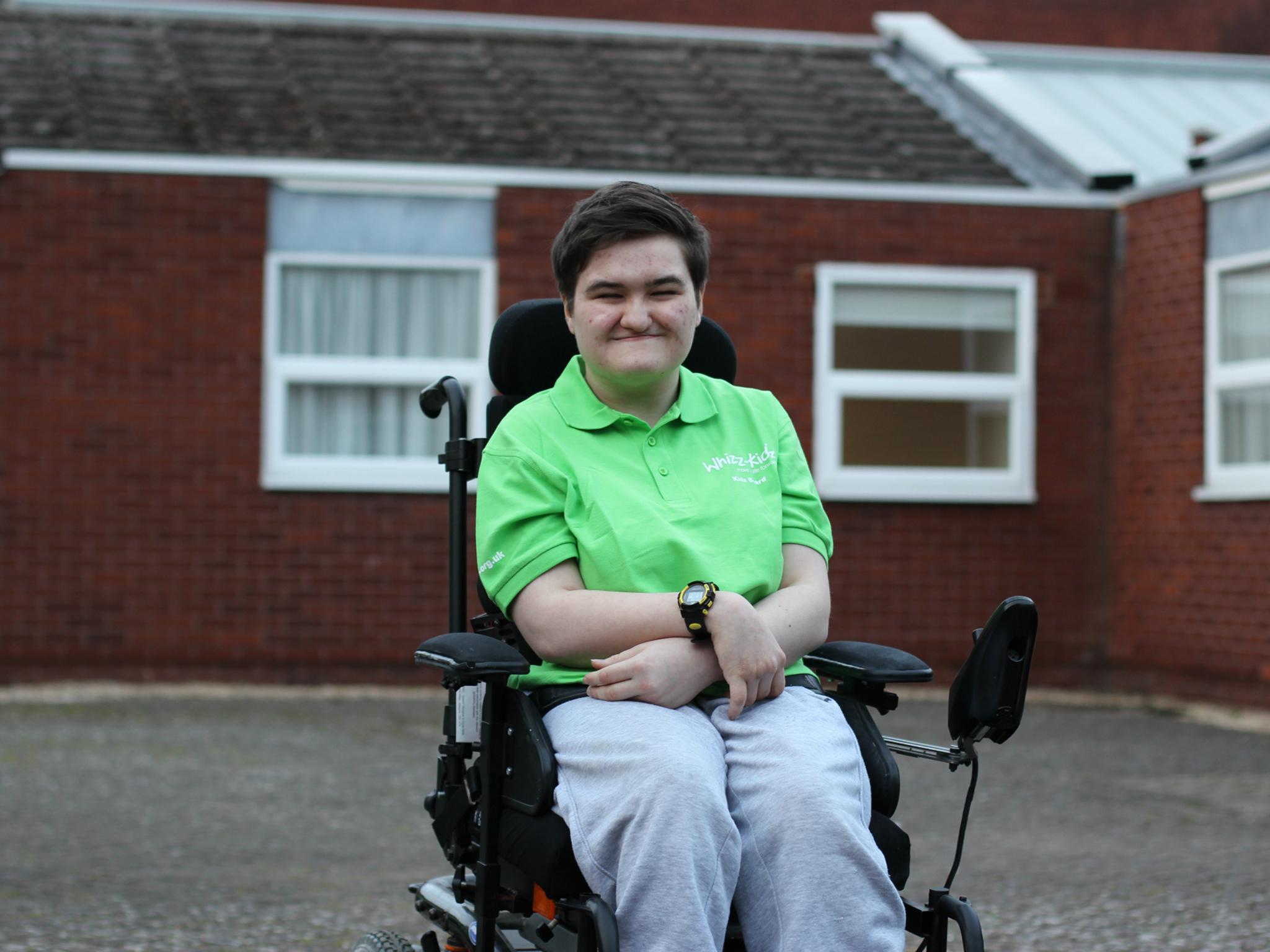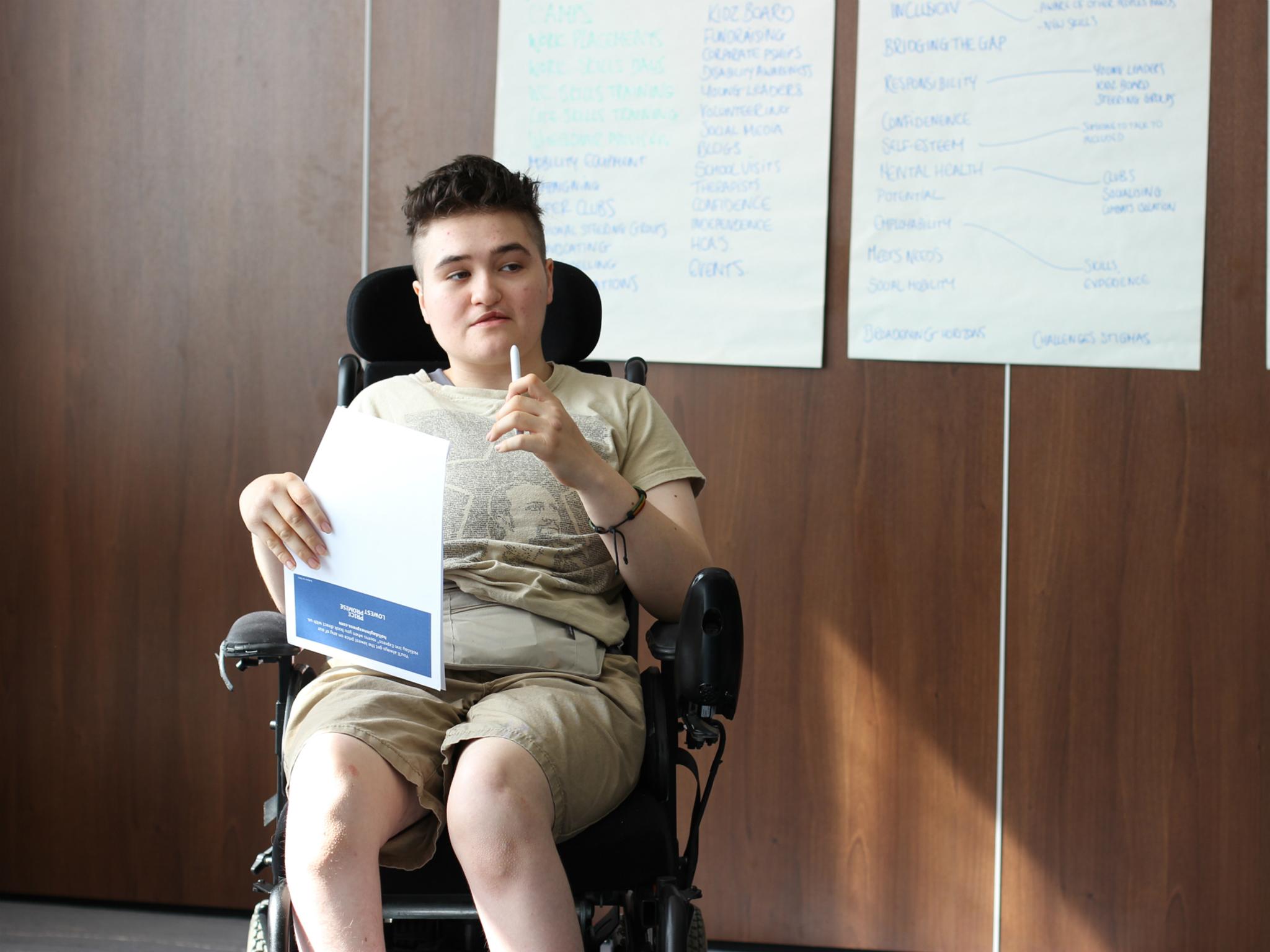A disabled, trans, bisexual man on what it's like to come out twice
Rian Hiney hopes to be a role model for other young disabled, LGBT people

“The fear of rejection is twice as scary when the person looking out for you is not only is your parent, but they also have a higher responsibility of care because of your disability,” says Rian Hiney. As a bisexual, trans man, the 17-year-old has not only had to reveal his sexuality to his loved ones, but his gender identity, too.
Growing up being treated as a girl, Rian tells The Independent that he “never exactly felt ‘feminine’.”
“My mum used to try and dress me in pretty ‘girly’ dresses but all I remember is how I used to refuse and how uncomfortable I felt. I was constantly labelled a ‘tomboy’ and now that I am older, I totally detest the word," says Rian, who was born with an unknown condtion similar to quadreplegic cerebral palsy.
“It’s just a phase. You’re a tomboy. You’ll grow out of this’, whatever ‘this’ is’,” is the response that Rian became used to hearing.
“If I am going to be honest, when I was younger I didn’t even know what ‘this’ was, I just knew that ‘this’ wasn’t a phase, ‘this’ was me and there was nothing I could do to change ‘this’," he adds.
As Rian grew older, he gradually realised there was vocabulary - “trans” - to describe what he was feeling. The term describes a person who does not identify with the gender they were assigned with at birth, and therefore doesn't relate to a person's sexuality. But first, he had to deal with coming out as a bisexual.
“I initially came out as bisexual at the age of 15," he says. "I remember I first told my sisters and my friends. It wasn’t a massive shock to them and they actually took it quite well. I don’t think I really came out as bisexual to my parents, I just talked about bringing a girl or a boy or whoever home one day, and they had a hard time at first but they kind of accepted it. My mum did keep asking about it, ‘so who do you prefer,’ and what I got from my dad is ‘you’re missing the point, you silly girl’.”
But Rian still didn't feel quite right. Having been open about his sexuality, he was still uncertain to articulate his feelings about his gender identity without any role models to follow.
"When I first heard the word ‘transgender’, I initially thought of the offensive and outdated stereotypes of ‘cross-dressers’ and ‘lady boys’," he says. "There was no representation for me to look up to.” Rian slipped into a depression, and his sister noticed the red flagsof his mental health. With her support, Rian was able to open up about how the gender he was assigned at birth didn’t match up with how he truly felt inside.
“I just asked her, ‘What do you think of the name Rian?’, and we went from there. I told her everything.”
What frightened him was how his parents - who were responsible for his care - would react. "I didn’t want to feel like a 'disappointment' to my mum, and with my dad being your typical old fashioned conservative type of guy, I was very apprehensive."
"In the end, it wasn’t too bad. I just kind of came out with it spontaneously one day and my Dad's reaction really surprised me. He was quite calm about the whole thing and he has taken it within his stride. And apart from her at first teasing me about the name Rian (she didn’t like it at first), my mum has been fine."
Still, Rian's journey to acceptance was far from over. He quickly learned that while he was certain he was bisexual, the prejudice towards disabled people meant that others struggled to understand how he could have sexual feelings at all. And when he came out as trans, the prejudice he already faced was compounded by an unwanted fascination with his sexuality. Disappointingly, he discovered that while the disabled and LGBT communities are largely progressive and open, Rian didn't always feel accepted.

“Both communities regularly face other people’s nonsense. People being condescending, trying to teach you about gender and or disability, people treating your identity as a burden, and both communities are still fighting for their rights,” says Rian. Recent figures show that attacked on LGBT people have spiked by 80 per cent in the UK over the last four years, while the United Nations recently criticised the Government for failing to uphold the rights of disabled people following the implementation of austerity policies.
“Our sexual identities are constantly under critique,” he goes on. “Within the Trans community we are often overly sexualised. People do not see anything wrong with asking invasive questions about our genitals. Transwomen are often objects of sexual desire for straight cis‐men, but then still face violent transphobia from these cis‐men. Transmen and Transwomen aren’t looked at as ‘real’ men or women by some people, if they haven’t chosen to or been able to get surgery on their genitals.”
“On the other hand, people don’t think those who have a disability and in particular, wheelchair users have the right to be intimate. Some people can’t even comprehend it – someone at school recently said to me, ‘How can you be bisexual? You’re disabled and you can’t even have sex’. Trans people are hypersexualised and disabled people are desexualised. This is why people struggle to box me in.”
“I haven’t always felt embraced by the trans community as someone who has a disability. I have heard ableist comments made within the LGBTQI community and I have encountered ableism within LGBTQI ‘safe’ spaces numerous times. I often see people who are supposed to be allies making offensive ableist comments on social media during arguments and it is.”
So Rian is facing his situation by paving the way for others like him. He is currently on the board of Whizz-Kidz, the charity for young people who use wheelchairs, and hopes to act as a role model to other disabled and LGBT people.
He looks to a future where coming out is no longer necessary.
“I hope a time will come in the future where people won’t need to ‘come out.’ Instead people will just be allowed to ‘be’. I can’t see that happening in this generation to be honest, but I am confident that we are changing things enough so that people in the next generation will find things slightly easier. That’s what it is all about.”
Join our commenting forum
Join thought-provoking conversations, follow other Independent readers and see their replies
Comments
Bookmark popover
Removed from bookmarks